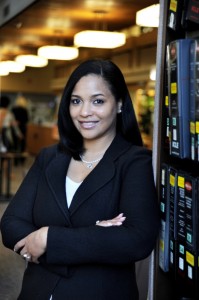Though they followed different paths to The John Marshall Law School and its Center for Real Estate Law, Soo Yeon Lee and Timnetra Burruss now share a common distinction. Both were named national Real Property Fellows by the American Bar Association (ABA) Real Property, Trust and Estate Law Section (RPTE).
As the only current RPTE fellows from Chicago, they are among a select group of six fellows chosen each year from a national pool of applicants.
Lee and Burruss were selected because of their practical experience in real estate law and demonstrated leadership at the local and national bar level. The goal of this program is to give young ABA members the chance to become more involved in substantive work of the RPTE section while developing skills for future leadership positions. Lee’s term extends through 2014; Burruss will finish her term in 2013.
 Lee earned both a JD and MS degree in Information Technology and Privacy Law from John Marshall in 2005. After graduation, Lee joined the law firm of Gordon & Centracchio, LLC, a general practice firm, specializing in litigation. Eventually she began to take on more cases involving real estate issues and understood how significantly the real estate transactional documents affected her clients’ businesses. From there, it made sense to focus more on commercial real estate law.
Lee earned both a JD and MS degree in Information Technology and Privacy Law from John Marshall in 2005. After graduation, Lee joined the law firm of Gordon & Centracchio, LLC, a general practice firm, specializing in litigation. Eventually she began to take on more cases involving real estate issues and understood how significantly the real estate transactional documents affected her clients’ businesses. From there, it made sense to focus more on commercial real estate law.
She decided to pursue an LLM in Real Estate Law at John Marshall, which she hopes to finish in the next few years while she takes classes part time while practicing full time.
“My work in litigation was always backward looking, assessing the parties’ rights, obligations and their past conduct. On the other hand, the role of a commercial real estate lawyer is forward looking,” Lee said. “You document your client’s deal and you seek to predict the risks and consequences of proposed future dealings. This role of a transactional attorney became very attractive to me and I wanted to utilize the experiences and knowledge I gained from litigation, which were practical and of real-life.”
“I could not have grown my practice in real estate law without my studies at the Center for Real Estate Law. My classes afforded me the practical knowledge necessary to truly understand the dynamics of the law surrounding a piece of real property and to spot issues that I otherwise would not have been able to,” Lee added.
Lee applied for the ABA Fellowship to help further her knowledge of real estate law. “The ABA Fellowship will help me gain more substantive knowledge in the real estate field by allowing me to work side-by-side with seasoned practitioners across the nation on various projects,” Lee said. “I am also interested in how the section functions and want to cultivate some of the same leadership qualities of these successful section leaders.” Already, Lee is immersed in RPTE section activities, moderating an upcoming teleconference call on retail leases.
 Burruss received a JD from DePaul University’s College of Law and currently works at the Cook County Board of Review as chief of staff for Commissioner Larry Rogers Jr. She pursued her LLM in Real Estate Law at the outset of her work at the Cook County Board of Review.
Burruss received a JD from DePaul University’s College of Law and currently works at the Cook County Board of Review as chief of staff for Commissioner Larry Rogers Jr. She pursued her LLM in Real Estate Law at the outset of her work at the Cook County Board of Review.
As chief of staff, her duties are varied, and she says her LLM training comes into play every day as she manages the daily operations of Rogers’ staff, including conducting analysis of commercial and residential files regarding property assessments and listening to oral arguments contesting valuations by attorneys and taxpayers.
“My favorite part of my job is knowing that my work can correct an assessment and potentially save money for a taxpayer—either residential or commercial—so that the taxpayer pays no more than their fair share in property taxes,” Burruss said. “It’s a great feeling to do your job well—to see your education, training and experience converge—so in the end you have an impact on potentially reducing someone’s final tax bill. It can save a business or dramatically affect a life.”
Burruss pursued the ABA Fellowship because she wanted to be exposed to more seasoned attorneys and issues surrounding their practices. “I engage with attorneys in other practice areas, but all affecting real estate law. The attorneys who are members of the RPTE section are very knowledgeable with a breadth of experience in all areas of real estate law,” Burruss said. “The Fellowship allows me to engage them, absorb their varied perspectives and contribute my ideas as well. It also gives me an opportunity to participate in the section leadership more quickly because it is a pipeline program, intended to prepare me for leadership in the ABA RPTE section.”
Both Lee and Burruss advise young attorneys to differentiate themselves with a specialized degree like an LLM, and to pursue outside activities that will make them stand out, such as participation in a local or national bar section.
Burruss sits on the board of the Black Women Lawyer’s Association (BWLA), co-chairs the BWLA Roundtable Committee and is a member of the Advocacy Committee for the Junior League of Chicago. Lee served as the director of the Pro Bono Legal Clinic of the Korean American Bar Association from 2008 through 2012 and sits on the board of directors of the Korean American Community Services.
“We are proud to have two John Marshall graduates join this elite pool of Fellows of the ABA’s RPTE section,” said Professor Celeste Hammond, director of the Center for Real Estate Law at the law school. “Only six new Fellows are chosen from a national pool of applicants each year—three in Real Property and three in Trusts & Estates.”
“We encourage our students to serve their community and the legal profession by pursuing local and national bar leadership positions. Such opportunities as the RPTE Fellowship offer our students an invaluable opportunity to further their careers through substantive real estate law projects, mentoring and networking with experienced real estate practitioners,” Hammond added.
The Real Property, Trust and Estate Law Section is a leading national forum for lawyers with nearly 25,000 members. The Real Property Division focuses on legal aspects of property use, ownership, development, transfer, regulation, financing, taxation and disposal. The Trust and Estate Division focuses on all aspects of trusts, estate planning, employee benefits, insurance and probate and trust litigation.
